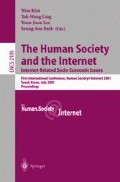Abstract
The World Wide Web (WWW) provides new opportunities for online education on the Internet. With other network tools being applied to the Web, it can create a virtual learning environment to bring together a community of learners for interactive education. Based on the investigation of the use of agent-based approach to e-Learning, this paper shares our views on how to develop an architecture framework to apply the electronic education on the Internet in an effective way.
Access this chapter
Tax calculation will be finalised at checkout
Purchases are for personal use only
Preview
Unable to display preview. Download preview PDF.
References
Crane, B.E. (2000), Teaching with the Internet, Neal-Schuman Publishers, Inc.
Wolz, U., McKeown K.R., and Kaiser G.E., (1992), Automated Tutoring in Interactive Environments: A Task-Centered Approach, in Intelligent Instruction by Computer, Theory and Practice, Taylor & Francis New York Inc.
Regian J.W. and Shute V.J., Evaluating Intelligent Tutoring Systems, in Technology Assessment in Education and Training, Lawrence Erlbaum Associates, Inc.
Lesser V R (1999), Cooperative Mutiagent Systems: A Personal View of the State of the Art, IEEE Transactions on Knowledge and Data Engineering, vol. 11,no.11 Jan–sFeb 1999
Ciancarina, P, Tolksdorf, R, Vitali, F, Rossi, D and Knoche, A (1998), Coordinating Multiagent Applications on the WWW:A Reference Architecture, IEEE Transactions on Software Engineering, vol. 24,no. 5, May 1998
Lashkari Y, Metral M, Maes P (1994), Collaborative Interface Agents, Proceedings of the Twelfth National Conference on Artificial Intelligence
Oates T, Prasad MVN, Lesser VR, Cooperative Information Gathering: A Distributed Problem Solving Approach
Forgy, C.L., Rete: A Fast Algorithm for the Many Pattern/ Many Object Pattern Match Problem, Artificial Intelligence 19, 17–37, 1982.
Riley, G., CLIPS, A Tool for Building Expert Systems. http://www.ghg.net/clips/CLIPS.html.
Author information
Authors and Affiliations
Editor information
Editors and Affiliations
Rights and permissions
Copyright information
© 2001 Springer-Verlag Berlin Heidelberg
About this paper
Cite this paper
Wai Chung Leung, E., Li, Q. (2001). Agent-Based Approach to e-Learning: An Architectural Framework. In: Kim, W., Ling, TW., Lee, YJ., Park, SS. (eds) The Human Society and the Internet Internet-Related Socio-Economic Issues. HSI 2001. Lecture Notes in Computer Science, vol 2105. Springer, Berlin, Heidelberg. https://doi.org/10.1007/3-540-47749-7_28
Download citation
DOI: https://doi.org/10.1007/3-540-47749-7_28
Published:
Publisher Name: Springer, Berlin, Heidelberg
Print ISBN: 978-3-540-42313-3
Online ISBN: 978-3-540-47749-5
eBook Packages: Springer Book Archive

